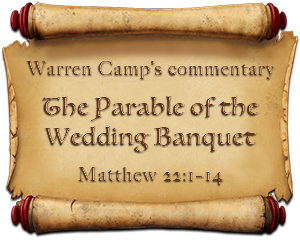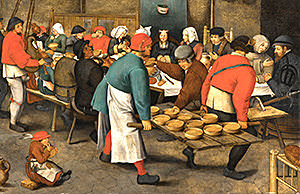
This is one parable that you won’t find presented to children in their Sunday school curriculum. It’s intended for “theologically mature audiences” only.
“For many are invited, but few are chosen.”

† Find Warren’s short summary at the bottom of page.

"The Wedding Feast" circa 1620, painted by Pieter Breughel the Younger [public domain]

Click the list or the “bird” to enlarge and use Warren’s list of forty-four of Jesus’ parables (a PDF file with links to Scriptures).
Start Reading Warren’s Commentary . . .
Find his summary at the bottom.
par•a•ble [noun] a simple story used to illustrate the meaning of or a moral or spiritual lesson, as told by Jesus in the gospels
synonyms: allegory, moral story/tale, fable
The Wedding Banquet (or Marriage Feast) Parable
Matthew 22:1–14
(It appears only in Matthew’s gospel.)
This instructive parable is charged with ironies. We have the Christ of “love your enemies” telling his story about about a king who took revenge on his enemies. The king’s invitation to his son’s wedding banquet declared that everyone was welcome: people who are evil and people who are good. But after the ragtag assembly of guests arrived, someone was found to be most unwelcome. That person was “bound hand and foot, and cast into outer darkness.” His offense? He failed to wear a customary wedding garment, which was a well-known requirement for Jews of that day. Learn more about that man and the subsequent consequence he endured, by reading Warren’s commentary that appears beneath this video.
This filmed video portrays Jesus’ actual telling of this parable.
The Parable of the Wedding Banquet
This parable is similar in some ways to the Parable of the Great Banquet (Luke 14:15–24). But the occasions are different and the accounts have important distinctions. Today’s Parable of the Wedding Banquet is rather straightforward. When put into context, there are a couple of simple-yet-crucial aspects of this story.
First, this isn’t just any banquet; it’s not a backyard barbecue; it’s the royal wedding banquet of the king’s son. Who in his or her right mind would refuse such an imperial invitation? And who would ever be the least bit presumptuous in such a setting? Nobody, that’s who, except for the people in this parable.
Second, Matthew integrates into the last third of this parable the suggestion of a second parable, that of the Badly Dressed Guest. This complicates the story a bit, and it’s a vital element as to why the story suddenly changes gears at its two-thirds point of this story that ends badly.
Before we dig deeply into the aspects and meaning of this parable, let’s look at how Jesus introduced it to the chief priests, Israelite elders, teachers of the Law, and Pharisees who’d been challenging him all through chapter 21.
22 1Jesus spoke to them again in parables, saying: 2“The kingdom of heaven is like a king who prepared a wedding banquet for his son. 3He sent his servants to those who had been invited to the banquet to tell them to come, but they refused to come.
4“Then he sent some more servants and said, ‘Tell those who have been invited that I have prepared my dinner: My oxen and fattened cattle have been butchered, and everything is ready. Come to the wedding banquet.’
5“But they paid no attention and went off — one to his field, another to his business. 6The rest seized his servants, mistreated them and killed them (Matthew 22:1–6).
While wedding banquets today can be elaborate productions, wedding banquets in Jesus’ days were one of the most joyous occasions in Jewish life. They often lasted for days, up to a week. In this parable, Jesus compares heaven to a wedding banquet that a king had prepared for his son (v. 2). Many people had been invited. But when the time for the banquet came and the table was set, those invited refused to come (vv. 4–5). In fact, the king’s servants who’d brought the joyful message to the multitudes were mistreated and even killed by those whom he’d invited (v. 6).
The timing of the story is nightmarishly awry. We’re told that a banquet was “all prepared ... everything is ready.” But the first invitation wasn’t successful. Those who were summoned “refused to come.” A second squad of servants was sent; those invited “paid no attention and went off.” Others turned murderous; they “seized his servants, mistreated them and killed them.”
7The king was enraged. He sent his army and destroyed those murderers and burned their city.
8“Then he said to his servants, ‘The wedding banquet is ready, but those I invited did not deserve to come. 9So go to the street corners and invite to the banquet anyone you find.’ 10So the servants went out into the streets and gathered all the people they could find, the bad as well as the good, and the wedding hall was filled with guests (vv. 7–10).
Enraged at the response of those who’d been invited, the king sent his army to avenge the death of his servants (v. 7). This portion of the parable invokes the old savage formula, reminiscent of the worst pages of the books of Kings; provocation called for retaliation that often ended with extermination. And so, “The king sent his army and destroyed those murderers and burned their city.” Having completed his vengeful acts, the king then had his servants scour the streets for guests, offering additional invitations to anyone whom his servants could find. The result? The wedding hall became filled (vv. 8–10).
11“But when the king came in to see the guests, he noticed a man there who was not wearing wedding clothes. 12He asked, ‘How did you get in here without wedding clothes, friend?’ The man was speechless.
13“Then the king told the attendants, ‘Tie him hand and foot, and throw him outside, into the darkness, where there will be weeping and gnashing of teeth.’
14“For many are invited, but few are chosen’ (vv. 11–14).
During the banquet, the king noticed a man “who was not wearing wedding clothes” (v. 11). When asked how he came to be there without the furnished attire, the man had no answer and was promptly ejected from the feast “outside, into the darkness, where there will be weeping and gnashing of teeth” (vv. 12–13). The king in his mercy was ready to forgive the man, so long as the man would present a viable reason for his failure. But the man was “speechless,” which indicated that he wasn’t innocent. He intentionally rejected the garment that the king had provided for him. Similarly, we, too, can be people who’ll be excluded from the kingdom of heaven because of our wrong, self-motivated choices.
Jesus then ended his parable by giving this statement to the chief priests and Pharisees: “For many are invited, but few are chosen” (v. 14). Jesus spoke this parable to show them (and every parable reader today) what the kingdom of heaven will be like when the end of the age comes. Many are called or invited into the kingdom, but none can come on their own; God invites them into his kingdom, otherwise they won’t make an effort to be one with Lord Jesus.
So, who’s who in Christ Jesus’ parable? The parable’s king is Father God. The king’s son who’s being honored at the banquet is Jesus Christ, who “came to that which was his own, but his own did not receive him” (John 1:11). Israel represents those invitees who’d been invited into the kingdom, but, when the time actually came for the kingdom to appear, they refused to believe that Jesus was Messiah. The murdered servants represent the multitude of prophets, including John the Baptist, who’d been killed by Israelites. As a result, the King’s (capital “K”) vengeful reprisal against the murderers speaks of the desolation mentioned in the book of Revelation. Then and today, the King’s judgment will come upon those who reject his offer of salvation.
The king’s wedding invitation had been extended to anyone and everyone — total strangers, both good and bad. This refers to the gospel being presented to the non-Jewish Gentiles. To those who refused his invitation, the king “sent his army and burned their city.” And, those who dressed inappropriately were “tied hand and foot, and thrown outside into the darkness.” Everyone, without exception, had received a free invitation to the king’s banquet. Today, everyone we know and don’t know has also been invited into the King’s kingdom. It, too, is a banquet of excess and extravagance. Sadly, for no apparent reason, many people refuse God’s generous invitation to enjoy and become part of his kingdom.
The feast’s anonymous guest (continued from my intro above) was someone from “the main highways,” perhaps homeless, almost certainly destitute. Why hadn’t this wedding goer worn a requisite festive robe? And why, when confronted about his street attire, didn’t this pitiful guest explain his plight? Why was he “speechless”? The poor whom we know today are often inarticulate, especially when confronted with threats and blustering of powerful people. What street-person today, hauled into court, finds a ready language of defense?
The people who refused the king’s invitation didn’t deserve to attend. The guest who showed up, inappropriately dressed, didn’t deserve to stay. The opening part of this parable describes the rejection of an invitation. The closing portion presents an expulsion based on presumption. Both scenarios ended badly. And Matthew describes both bad endings using similar language.
The matter of the wedding garment is instructive. In ancient oriental marriage feasts, special wedding garments were provided by the king himself. A feast filled with properly dressed guests would be an honor to the king and the marriage. So, an improperly dressed person would bring dishonor upon the host and ruin the festive occasion; it would be a gross insult to the king for a guest to have refused to wear the host-provided garment. The man who was caught wearing his street clothing learned the full extent of his offense when he was removed from the celebration and cast into a doom of darkness.
Clearly, the parable’s 1st-century hearers would have understood the fact that the problematic guest wouldn’t be welcomed or accepted at the wedding banquet if he wore his everyday, non-wedding clothing. The meaning of this specific aspect of the story isn’t immediately evident. Although, like many parables, the story doesn’t state its point directly, the guests’ “clothes” represent their spiritual condition. The nonconforming guest considered his own clothes amply adequate, since he said nothing when asked. But the king judged that man by his own standard, renouncing him for not wearing suitable wedding-guest attire. Christ’s words herein are, today, clearly aimed at those who, like the Pharisees, trust in self-righteousness. Just as the king provided wedding garments for his guests, God provides salvation for mankind. Our wedding garment is the righteousness of Christ; unless we agree to wear it, we’ll be prevented from appreciating gain when we attend the King’s big wedding feast in his kingdom.
Rejecting the garment of Christ’s righteousness represents a rejection of the character that qualifies men and women to become children of God. Humans have nothing proper of their own to wear; after all, “all our righteous acts are like filthy rags” (Isaiah 64:6). They’re acceptable in the presence of Father God only, when people accept the perfect righteousness of Jesus Christ. In this parable, Jesus told his hearers that their own “garment” — their self-righteousness — simply wasn’t good enough. They and we can attend the Lord’s coming banquet only if and when we dress suitably in his righteousness, not ours.
So what? What should we make of Jesus’ parable? It should remind us that we’re called to obey God and that our human righteousness will never be perfect. Despite our best intentions and efforts, our good deeds will sometimes be done for the wrong reasons; our behavior will never be perfect. Therefore, we’re expected to wear appropriate spiritual “clothing” rather than what we deem correct. That’s why we are commanded to “Clothe yourself with the Lord Jesus Christ” (Romans 13:14) for it’s God himself who is “the Lord our righteousness” (Jeremiah 33:1). As Apostle Paul put it, we should “be found in him, not having a righteousness of [our] own that comes from the law, but that which is through faith in Christ — the righteousness that comes from God on the basis of faith” (Philippians 3:9). Our “best clothes” are the spiritual clothes that God gives us to wear for him.
Three Hearty Application Questions to Answer
1. What can a royal wedding party tell us about God’s kingdom?
2. Does the king’s energetic moves to fill his son’s wedding banquet originate from compassion or pride (or a brew of both)? The outcome and its implications are left for us to judge.
3. God invites everyone to his banquet, so that we may share in his joy. Are you ready to feast at the Lord’s banquet table?
“For many are invited, but few are chosen” (Matt. 22:14).

Take our “Parables Quiz.”
See Warren’s other “Parables of Jesus” commentaries.
— Warren’s Concise Summary —
In the Parable of the Wedding Banquet, Jesus likens the kingdom of heaven to a king who prepares a lavish wedding feast for his son, only to have the invited guests refuse to attend. Some even mistreated and killed his messengers. In response, the king destroys those murderers and opens the banquet to everyone found on the streets — both good and bad — filling the hall with guests.
However, when the king notices a man not wearing the required wedding garment, he has him cast out into the darkness, illustrating that while the invitation to God’s kingdom is extended to all, it requires a sincere transformation and readiness to remain. Jesus concludes the teaching with the sobering reminder: “For many are invited, but few are chosen.”
